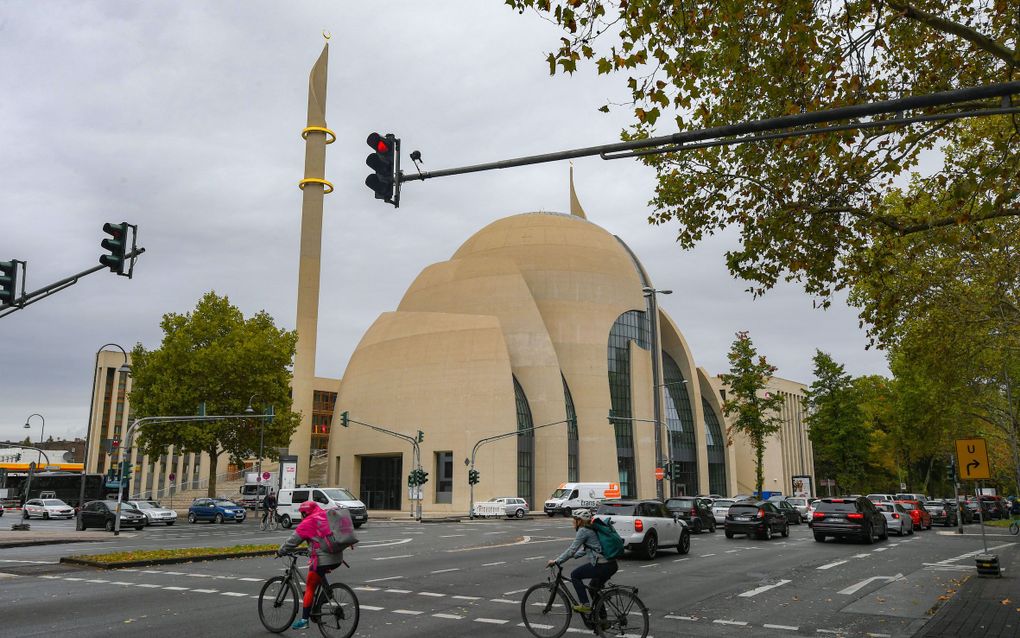Will Islamic prayers soon sound over Cologne?

The Central Mosque in Cologne is almost as dominant as the famous Dom. Photo AFP, Patrik Stollarz
Central Europe
Will Cologne still be Cologne? Over a week ago, the city council announced that mosques could request to sound a call to prayer once a week.
With its cathedral, Cologne is more than the city of the Roman Catholic Rhineland. As mayor, Konrad Adenauer refused to hang Nazi flags on public buildings when Adolf Hitler visited, Dutch Reformed Daily newspaper writes. It cost the later Chancellor his job in 1933. Some people say that the spirit of the Germans resides in the city and particularly in the cathedral.
The fact that mosques were allowed to request a muezzin, the man who calls to prayer, caused quite a stir all over Germany. Should the muezzin be shouting over this Christian city?
One can argue that Cologne is not that Christian anymore. Moreover, it is not the first German municipality to give the Islamic call to prayer green light.
Freedom and diversity
Mayor Henriette Reker stated that "Cologne is the city of religious freedom and diversity. Anyone entering our city's central station is greeted by the cathedral and the ringing of church bells. On the other hand, many inhabitants of Cologne are Muslims." And: "While in Christian churches the bells are rung to call the faithful to attend church services, in Islamic faith communities it is the muezzin who performs this task."
Reker indicated that this is a two-year trial. The call to prayer may only sound on Friday afternoons between twelve and three o'clock and may not last more than five minutes. The volume depends on the location of the mosque. And residents must be informed in advance.

So far, not one of the 35 Cologne mosques has submitted a request, but that seems to be only a matter of time. Three mosques have already requested additional information from the city council.
Very different from church bells
Opponents of the prayer calls are not sitting on their hands. The Egyptian political scientist Hamed Abdel-Samad, for example, states in the daily Die Welt that the muezzin cannot be compared to the ringing of church bells. "Church bells are not used for propaganda like the call to prayer. When Allahu Akbar sounds, that is, "Allah is greater than all religions, all enemies, all people, and Mohammed is his prophet", it is nothing less than a dictation to the rest of society."
The chairman of the Conference of Confessing Communities in the Protestant Churches of Germany, Pastor Ulrich Rüß (Hamburg), entirely agrees. "While the ringing of bells is an acoustic signal to invite people to worship, the muezzin call is the witnessing of the absoluteness of Allah and the Islamic faith in Arabic", he told the German Evangelical News Agency IDEA. According to Rüß, the muezzin's call constantly proclaims Islam's claim to power: "This has nothing to do with religious freedom and openness. It has very little to do with religious freedom and openness and nothing to do with desirable integration."
Rüß also wonders why the churches do not speak out, but only an "eloquent silence" can be heard. "Apparently, they don't want to be seen as intolerant, eternalist and open to all religions. and open to all religions, and not to burden the Christian-Islamic dialogue". However, respect for one's faith demanded that criticism be voiced and clarification provided.
Integrative part of religious life
Bishop Heinrich Bedford-Strohm, chairman of the Evangelical Church of Germany EKD (which encompasses most Protestants in the country), has no reservations. "If this is seen in Cologne as an integrative part of a religious life, then there is nothing to be said against it," the Munich Bishop who will leave office in November expressed in an interview with the Mannheimer Morgen.
It is something "that has to be clarified very much on the spot". We live in a culture that is evolving: "That's why we have to intensify the interreligious dialogue – in the spirit of tolerance that I wish for society as a whole." For Bedford-Strohm, the fact that Muslims practise their religion here "not only in private" is part of a democratic society.
Sociologist and Islam expert Necla Kelek criticises the project: "When Allahu Akbar is shouted, men come together. The men who have their wives at home," she told Bild. According to their husbands, these women should have no place in public – "hence the headscarf if they were to go out in public". Kelek was concerned that a female mayor, of all people, was confirming to these men that this image of society was okay.
Extension of Erdogan
In Focus magazine, writer Ahmaed Mansour points out that quite a few mosques in Cologne fall under the Ditib association and are thus an extension of Turkish President Erdogan. "That association stands out because of slurs against Christians, Jews and liberal Muslims."
The Frankfurter Allgemeine did street interviews in Cologne this week. An anonymous passer-by said: "The call to prayer is not about the sound or the noise – that hardly bothers anyone. It's about political Islam and its influence here in Germany."
64 per cent against
According to a recent survey, about three-quarters of the citizens in Germany are against the muezzin call being as natural as the ringing of church bells, IDEA writes. Sixty-four per cent "definitely not" want this. It resulted from a representative survey conducted by the opinion research institute Civey on behalf of the "Bonner General-Anzeiger". According to the study, 18 per cent are in favour of the Islamic call to prayer. Six per cent are undecided.



